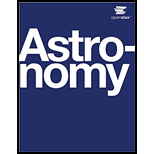
Astronomy
1st Edition
ISBN: 9781938168284
Author: Andrew Fraknoi; David Morrison; Sidney C. Wolff
Publisher: OpenStax
expand_more
expand_more
format_list_bulleted
Textbook Question
Chapter 4, Problem 49E
Suppose Earth took exactly 300.0 days to go around the Sun, and everything else (the day, the month) was the same. What kind of calendar would we have? How would this affect the seasons?
Expert Solution & Answer
Want to see the full answer?
Check out a sample textbook solution
Students have asked these similar questions
The earth revolves around the sun in exactly 365 1/4 days which is equivalent to 1 year. To make up for the loss of 1/4 day, the calendar was adjusted so that we have a leap year for every 4 years. If the earth were to speed in its motion slightly so that a year would be completed in exactly 365 days and 6 hours, how often would we need to have a leap year?
The number of hours of daylight in Boston is given by y=3sin [2π(x - 79)/365] + 12, where x is the number of days after January 1. Solve, Within a year, when does Boston have 13.5 hours of daylight? Give your answer in days after January 1 and round to the nearest day.
What would be duration of year, if distance
Between earth & the sun got doubled?
10 129 days w 365 days (01) 500 days (iv) 1032 days
Chapter 4 Solutions
Astronomy
Ch. 4 - Discuss how latitude and longitude on Earth are...Ch. 4 - What is the latitude of the North Pole? The South...Ch. 4 - Make a list of each main phase of the Moon,...Ch. 4 - What are advantages and disadvantages of apparent...Ch. 4 - What are the two ways that the tilt of Earth’s...Ch. 4 - Why is it difficult to construct a practical...Ch. 4 - Explain why there are two high tides and two low...Ch. 4 - What is the phase of the Moon during a total solar...Ch. 4 - On a globe or world map, find the nearest marked...Ch. 4 - Explain three lines of evidence that indicate that...
Ch. 4 - What is the origin of the terms “a.m.” and “p.m.”...Ch. 4 - Explain the origin of the leap year. Why is it...Ch. 4 - Explain why the year 1800 was not a leap year,...Ch. 4 - What fraction of the Moon’s visible face is...Ch. 4 - Why don’t lunar eclipses happen during every full...Ch. 4 - Why does the Moon create tidal bulges on both...Ch. 4 - Why do the heights of the tides change over the...Ch. 4 - Explain how tidal forces are causing Earth to slow...Ch. 4 - Explain how tidal forces are causing the Moon to...Ch. 4 - Explain why the Gregorian calendar modified the...Ch. 4 - The term equinox translates as “equal night.”...Ch. 4 - The term solstice translates as “Sun stop.”...Ch. 4 - Why is the warmest day of the year in the United...Ch. 4 - When Earth’s Northern Hemisphere is tilted toward...Ch. 4 - Where are you on Earth if you experience each of...Ch. 4 - In countries at far northern latitudes, the winter...Ch. 4 - What is the phase of the Moon if it . . . A. rises...Ch. 4 - A car accident occurs around midnight on the night...Ch. 4 - The secret recipe to the ever-popular veggie...Ch. 4 - Your great-great-grandfather, who often...Ch. 4 - One year in the future, when money is no object,...Ch. 4 - Suppose you lived in the crater Copernicus on the...Ch. 4 - In a lunar eclipse, does the Moon enter the shadow...Ch. 4 - Describe what an observer at the crater Copernicus...Ch. 4 - The day on Mars is 1.026 Earth-days long. The...Ch. 4 - What is the right ascension and declination of the...Ch. 4 - What is the right ascension and declination of the...Ch. 4 - What is the right ascension and declination of the...Ch. 4 - During summer in the Northern Hemisphere, the...Ch. 4 - On the day of the vernal equinox, the day length...Ch. 4 - Regions north of the Arctic Circle are known as...Ch. 4 - In a part of Earth’s orbit where Earth is moving...Ch. 4 - In a part of Earth’s orbit where Earth is moving...Ch. 4 - If Sirius rises at 8:00 p.m. tonight, at what time...Ch. 4 - What are three lines of evidence you could use to...Ch. 4 - If the Moon rises at a given location at 6:00 p.m....Ch. 4 - Explain why some solar eclipses are total and some...Ch. 4 - Why do lunar eclipses typically last much longer...Ch. 4 - Suppose Earth took exactly 300.0 days to go around...Ch. 4 - Consider a calendar based entirely on the day and...Ch. 4 - If a star rises at 8:30 p.m. tonight,...Ch. 4 - What is the altitude of the Sun at noon on...Ch. 4 - Show that the Gregorian calendar will be in error...
Additional Science Textbook Solutions
Find more solutions based on key concepts
Your 200-g cup of tea is boiling-hot. About how much ice should you add to bring it down to a comfortable sippi...
An Introduction to Thermal Physics
10. Coherent light with wavelength 600 nm passes through two very narrow slits and the interference pattern is ...
College Physics (10th Edition)
Choose the best answer to each of the following. Explain your reasoning. Which of these star clusters is oldest...
Cosmic Perspective Fundamentals
An ideal gas expands quasi-statically and isothermally from a state with pressure p and volume V to a state wit...
University Physics Volume 2
When the Moon assumes its characteristically thin crescent shape, the position of the Sun is a almost directly ...
Conceptual Integrated Science
1. When is energy most evident?
Conceptual Physics (12th Edition)
Knowledge Booster
Learn more about
Need a deep-dive on the concept behind this application? Look no further. Learn more about this topic, physics and related others by exploring similar questions and additional content below.Similar questions
- On the day of the vernal equinox, the day length for all places on Earth is actually slightly longer than 12 hours. Explain why.arrow_forwardConsider a calendar based entirely on the day and the month (the Moon’s period from full phase to full phase). How many days are there in a month? Can you figure out a scheme analogous to leap year to make this calendar work?arrow_forwardWhat would be the duration of the year, if the distance between the earth and the sun gets doubled ? (a) 129 days (b) 365 days (c) 556 days (d) 1032 dayşarrow_forward
- If city is located in 2.8° north latitude and 46.0° east longitude. From there, you want to fly to a city in 7° north latitude and 52° east longitude. How much is the arc length of the big circle at 11000 m when the earth's radius is 6370 km? The arc length is 14223 km. Give your answer rounded to one kilmetre. Your last answer was interpreted as follows: 14223 XAnswer is incorrect. Keep centre of Earth as origin and define vectors to cities. Try again.arrow_forwardEx. 10 : What would have be the duration of the year if the distance between earth and sun were half the present distance ?arrow_forwardWhat should be the duration of the year if the distance between the earth and the sun gets doubled?arrow_forward
- Right Ascension and Declination is a coordinate system for objects in the sky, and is analogous to longitude and latitude coordinates, respectively, for objects on Earth. Right ascension (RA) coordinates are given in hours (h), minutes (m), and seconds (s). Declination (DEC) coordinates are given in degrees (°), arcminutes ('), and arcseconds ("). Sirius is the brightest star in the night sky. Its RA and DEC coordinates are 6h 45 m 7.96 s and -16° 44' 78.6". Using unit conversion, find the RA coordinate only in hours and round the coordinate to 5 significant figures.arrow_forwardThere is one part to this question. I need to know the days. Thank you!arrow_forward1) How many kilometers are spanned by an arc of 0.5° latitude (Dj = 1°) along the DateLine? 2) At what latitude is the zonal distance spanned by an arc of 1° longitude (Dl = 1°) exactly half as long as the equivalent meridional distance spanned by an arc of 1° latitude (Dj =1°)?arrow_forward
- There are 12 lunar months in a lunar calendar. The numbers of days of the lunar months differ by at most one day. The average number of days of a lunar month is approximately equal to the period of the lunar phase cycle. One year in a solar calendar is approximately equal to the period of the cycle of seasons. Which of the following can roughly keep a lunar calendar synchronized with a solar calendar? a) Adding a thirteenth lunar month to 7 out of every 19 years. b) Adding an extra day every 4 years. c) Having an extra month with 5 days each year. d) Skipping a lunar month every 7 out of 19 years.arrow_forwardShow that the Gregorian calendar will be in error by 1 day in about 3300 years.arrow_forwardExplain why the year 1800 was not a leap year, even though years divisible by four are normally considered to be leap years.arrow_forward
arrow_back_ios
SEE MORE QUESTIONS
arrow_forward_ios
Recommended textbooks for you
 AstronomyPhysicsISBN:9781938168284Author:Andrew Fraknoi; David Morrison; Sidney C. WolffPublisher:OpenStax
AstronomyPhysicsISBN:9781938168284Author:Andrew Fraknoi; David Morrison; Sidney C. WolffPublisher:OpenStax Stars and GalaxiesPhysicsISBN:9781305120785Author:Michael A. Seeds, Dana BackmanPublisher:Cengage Learning
Stars and GalaxiesPhysicsISBN:9781305120785Author:Michael A. Seeds, Dana BackmanPublisher:Cengage Learning An Introduction to Physical SciencePhysicsISBN:9781305079137Author:James Shipman, Jerry D. Wilson, Charles A. Higgins, Omar TorresPublisher:Cengage Learning
An Introduction to Physical SciencePhysicsISBN:9781305079137Author:James Shipman, Jerry D. Wilson, Charles A. Higgins, Omar TorresPublisher:Cengage Learning

Astronomy
Physics
ISBN:9781938168284
Author:Andrew Fraknoi; David Morrison; Sidney C. Wolff
Publisher:OpenStax

Stars and Galaxies
Physics
ISBN:9781305120785
Author:Michael A. Seeds, Dana Backman
Publisher:Cengage Learning

An Introduction to Physical Science
Physics
ISBN:9781305079137
Author:James Shipman, Jerry D. Wilson, Charles A. Higgins, Omar Torres
Publisher:Cengage Learning

Time Dilation - Einstein's Theory Of Relativity Explained!; Author: Science ABC;https://www.youtube.com/watch?v=yuD34tEpRFw;License: Standard YouTube License, CC-BY